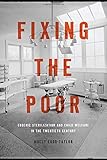Fixing the poor : eugenic sterilization and child welfare in the twentieth century / Molly Ladd-Taylor.
Material type: TextPublication details: Baltimore : Johns Hopkins University Press, (c)2017.Description: 1 online resource (ix, 275 pages) : illustrationsContent type:
TextPublication details: Baltimore : Johns Hopkins University Press, (c)2017.Description: 1 online resource (ix, 275 pages) : illustrationsContent type: - text
- computer
- online resource
- 9781421423739
- Involuntary sterilization -- United States -- History -- 20th century
- Sterilization (Birth control) -- United States -- History -- 20th century
- Eugenics -- United States -- History -- 20th century
- Mentally ill -- Government policy -- United States -- 20th century
- Poor -- Government policy -- United States -- 20th century
- Sterilization, Involuntary -- history
- Mentally Disabled Persons -- history
- Intellectual Disability -- history
- Eugenics -- history
- Vulnerable Populations
- Human Rights Abuses -- history
- History, 20th Century
- HV4989 .F595 2017
- COPYRIGHT NOT covered - Click this link to request copyright permission: https://lib.ciu.edu/copyright-request-form
| Item type | Current library | Collection | Call number | URL | Status | Date due | Barcode | |
|---|---|---|---|---|---|---|---|---|
 Online Book (LOGIN USING YOUR MY CIU LOGIN AND PASSWORD)
Online Book (LOGIN USING YOUR MY CIU LOGIN AND PASSWORD)
|
G. Allen Fleece Library ONLINE | Non-fiction | HV4989 (Browse shelf(Opens below)) | Link to resource | Available | on1015372392 |
Includes bibliographies and index.
The feebleminded menace and the innocent child -- Two roads to sterilization -- Who was feebleminded? -- The price of freedom -- Sterilization and welfare in depression and war -- From fixing the poor to fixing the system?
Between 1907 and 1937, thirty-two states legalized the sterilization of more than 63,000 Americans. In Fixing the Poor, Molly Ladd-Taylor tells the story of these state-run eugenic sterilization programs. She focuses on one such program in Minnesota, where surgical sterilization was legally voluntary and administered within a progressive child welfare system.Tracing Minnesota's eugenics program from its conceptual origins in the 1880s to its official end in the 1970s, Ladd-Taylor argues that state sterilization policies reflected a wider variety of worldviews and political agendas than previously understood. She describes how, after 1920, people endorsed sterilization and its alternative, institutionalization, as the best way to aid dependent children without helping the "undeserving" poor. She also sheds new light on how the policy gained acceptance and why coerced sterilizations persisted long after eugenics lost its prestige. In Ladd-Taylor's provocative study, eugenic sterilization appears less like a deliberate effort to improve the gene pool than a complicated but sadly familiar tale of troubled families, fiscal and administrative politics, and deep-felt cultural attitudes about disability, dependency, sexuality, and gender. Drawing on institutional and medical records, court cases, newspapers, and professional journals, Ladd-Taylor reconstructs the tragic stories of the welfare-dependent, sexually delinquent, and disabled people who were labeled feebleminded and targeted for sterilization.
COPYRIGHT NOT covered - Click this link to request copyright permission:
There are no comments on this title.
